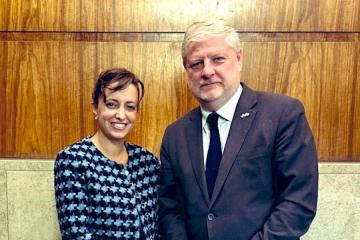The Scottish Government faces intensified scrutiny regarding its enigmatic “critical friendship” with Israel, a designation that has drawn sharp criticism amidst the ongoing conflict and humanitarian crisis in Gaza. This controversial stance has sparked a robust parliamentary challenge, urging ministers to clarify their position and ensure greater transparency in their diplomatic engagements.
At the heart of the debate is a confidential meeting held last year, where the term “critical friend” was reportedly used to describe Scotland’s relationship with Israel. The details of this encounter only surfaced after a protracted Freedom of Information battle, revealing the government’s efforts to conceal the minutes and the nature of the discussions.
Green MSP Ross Greer has spearheaded the call for accountability, tabling a written question demanding clarity on whether the Scottish Government still maintains this “critical friend” descriptor. Greer asserts that the lack of openness on such a sensitive issue has “let themselves down,” undermining public trust and democratic principles.
Beyond the lack of transparency, Greer has also criticised the SNP Government for failing to translate its public condemnations of Israeli actions into tangible policy changes. Specifically, he highlights the continued public funding for companies involved in selling arms to Israel, arguing that such actions contradict the government’s stated humanitarian concerns.
“To suggest that our country could be any sort of ‘friend’ of the apartheid regime responsible for these crimes is frankly offensive,” Greer stated, drawing a stark contrast between the government’s public pronouncements and its perceived private conduct. This dichotomy fuels public outrage and calls for a more coherent and ethically aligned foreign policy.
In response to earlier public anger surrounding the disclosed meeting, John Swinney, then a minister, had suggested the encounter aimed to convey Scotland’s consistent position on the suffering of innocent civilians. However, a prior government statement also indicated discussions on “areas of mutual interest,” including culture and renewable energy, raising questions about the true agenda.
Greer’s persistent questioning extends to the very genesis of this “critical friend” policy, demanding to know who authorised such a stance and when, if ever, it changed. He underscores the frustration among many within the SNP and the wider public who have long championed the Palestinian cause and expect stronger action from their government.
More recently, Angus Robertson, another Scottish Government minister, has affirmed that it would not be appropriate to meet with the Israeli Government until significant progress is made towards peace. He reiterated calls for the recognition of a sovereign Palestinian state and advocated for sanctions against Israel should violence persist, signaling a potential shift in diplomatic tone.
This evolving stance, while welcomed by some, continues to be scrutinised against the backdrop of past actions and the urgent need for adherence to international obligations, particularly concerning investigations into alleged war crimes and genocide. The pressure remains on the Scottish Government to demonstrate genuine commitment to human rights and international law.






Leave a Reply